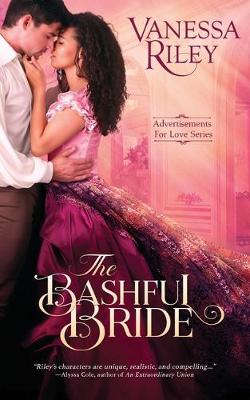
llamareads
Written on May 20, 2018
She closed her eyes, forgetting the noisy inn and even Bex’s honey voice and said, “‘The very instant that I saw you did my heart fly to your service, there it resides to make me a slave to it.’”
“No. No one is a slave, or they shouldn’t be. No, you have choices. I want to be your choice, Miss Croome.”
When Ester finds out her father has arranged a marriage for her – to a man known to be a womanizer – she’s frantic to get out of it. So, when the suitor who’s answered her best friend’s marriage ad turns out to be Arthur Bex, the Shakespearean actor she’s had a crush on for years, she jumps at the chance to elope with him to Gretna Green that very night. Bex is taken with the young woman, and has reasons of his own for wanting a wife. But between family opposition, Bex’s role in the dangerous abolition movement, and family secrets, can their chance at love survive?
There’s a bit of a fairytale vibe to Ester’s story. Ester remembers living over her father’s warehouse when his business was just getting started, but now lives in a mansion complete with servants, so there’s a definite rags-to-riches air. There’s also a few continued references to 5 minutes after midnight. Ester tells her friend that fairy tales end at midnight, but anything that goes on after is real – a silly fancy that encapsulates Ester’s character.
I have mixed feelings about this book. The main issue was that I was just horrifically frustrated with Ester. She is young (nearly 21) and about as sheltered as a young black woman could be in 1820s London. Halfway through the book, Ester and Arthur were still rehashing the “should we marry/ shouldn’t we marry” thing, and it just felt so repetitive. I’m not saying it was unreasonable for Ester or Arthur to have doubts – they did decide to get married after two cups of tea! – but it gave a very negative spin to the relationship with all they reasons they shouldn’t get married – and even some why they should – being negative. Every time it seemed like they were making forward progress, something would come up that would send both of them back to the “let’s not get married!” conversation again.
“Why did you marry me? Do you love me?”
He didn’t know how to describe what he felt—part gratitude, part hope, part glad to be chosen—that she cared so much for him. He stood up, pulling her to her feet. “I care for you more than myself. Perhaps that is love. I know what it cost for you to go through with this wedding and to even jump through that window. Your reasons for saying yes matter less to me, only that you did say it.”
She hooked her hand about his neck and draped her head against his bum shoulder. “What does matter to you, Bex?”
“You. You do, Ester.”
Ester’s other character flaw – and one I found easier to understand – was that she struggles with forgiveness, expecting everyone to forgive her but being unwilling to forgive others. Recently, she found evidence that her father had been unfaithful to her mother, and ever since, she’s been cold to him. Even more so, she looks down on her mother as weak for forgiving him. Her father’s actions since – acting genuinely contrite – she views as her mother being bought off with expensive gifts and parties. She calls her mother a “couch woman” – someone who’s just willing to wait around for her husband to come home. With Arthur, she wants him to give up his abolitionist rallies as too dangerous – she doesn’t want to sit at home worrying about him and wondering if he’ll come home at all. She fails to recognize how important that work is to Arthur, and struggles to forgive him when he continues the work after their marriage. Eloping with Arthur gets her pretty much disowned by her family (she left during her mother’s party without leaving a note or anything, so her family feared she was dead or kidnapped), and it takes nearly 3/4s of the book before she starts understanding exactly how much she’s wronged her family and Arthur.
As for things I liked, I was fascinated by Bex’s work with the abolition movement, as it’s something I haven’t read much about before, and horrified by his family secrets. When they ignored their doubts about their relationship, I liked Bex and Ester’s attempts to build a marriage based on the affection they felt for each other, and I liked their banter.
Overall, I think this would be more of a 3.5 star read for me, but I’m rounding up to 4 just because I did truly enjoy it. I’m looking forward to Frederica’s story!
I received this book for free from NetGalley in exchange for an honest review. This does not affect my opinion of the book or the content of my review.
